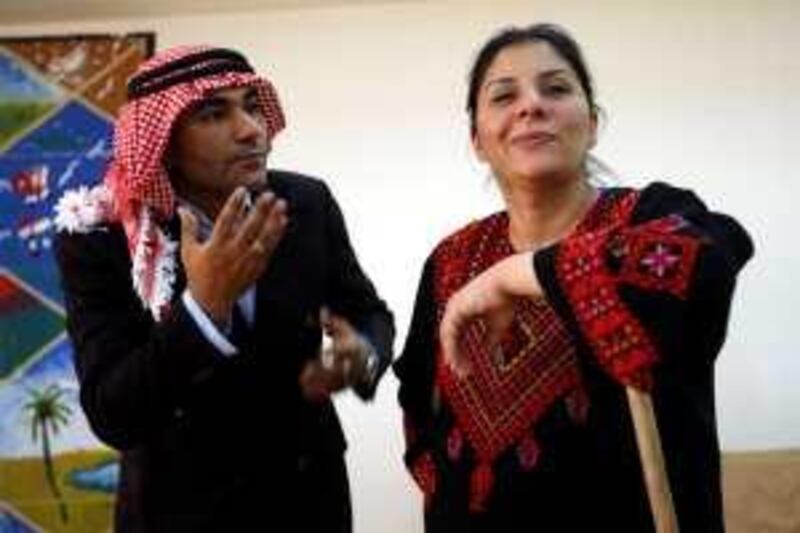AMMAN // Um Jaser is pregnant with her seventh child. She has a constant backache from the repeated pregnancies and looking after her six children, four boys and two girls, has turned her life into an endless routine of housework. The stress is clouding her thoughts to the extent she thinks her husband, Abu Jaser, is considering taking a cousin as a second wife.
But her main concern is her husband's meagre monthly income of US$130 (Dh477), which can hardly sustain the growing needs of the family. "I haven't slept all night thinking about how are we going to manage. Eid is the day after tomorrow; Jaser needs trousers, shirt and shoes; Ahmed wants the same; Salem wants jeans and glasses," she said. "Ninety dinars is not enough to look after even five children."
"Shall I steal?" Abu Jaser, asked. "No, borrow money", his wife replied. "But I am already sinking in debt," Abu Jaser said. The scene is from a play that tackles reproductive health in Jordan, but unlike most stage productions, the audience of nearly 100 men and women do not sit silently. They frequently offer up advice to "the couple" on how to tackle their problems. At a time when many Jordanians have become fixated by Star Academy, audience participation in theatre also has become hugely popular.
"Why do you think she has a backache? What is the major problem facing Um Jaser and Abu Jaser? ? What advice can you give to the couple?" a facilitator asks. One woman suggested breastfeeding, which would give Um Jaser some space in between pregnancies. A man suggested Um Jaser weave fleece or make goat cheese to supplement the family income. Another woman said the family should have had fewer children, while another said it was too late for them to start family planning but that they could pass on the lessons to their children.
Part of the attraction of interactive theatre is that it allows audiences to engage with the actors and change the course of events. "The objective is to encourage audience participation in the drama so that they can learn new skills, make decisions and solve problems," said Lina Attel, the director of the Performing Arts Centre (PAC) of King Hussein Foundation and the brain behind this style of theatre in Jordan.
"We want the audience to engage in the drama and the content of the play rather than being passive," she said. Mrs Attel, who obtained her master's in theatre in Education in Britain in 1985, introduced the method in Jordan two years later. Interactive theatre, she said, seeks to dispel common stereotypes about reproductive health, women and honour crimes, as well as issues such as how to deal with family squabbles and generation gaps.
"We were careful in choosing the themes that had to be shaped to suit people's needs. We wanted to tackle issues that affect people's lives directly. "People are either with or against the antagonist, but what we aspire for is to change the negative misconceptions such as those relating to early marriages, men who believe they have the right to beat their wives and the stereotyping of women in society," she said.
A deeply rooted tradition in Jordan favours large families and, despite national efforts to curb crimes against women carried out in the name of "honour", sentences are lenient for men convicted of such crimes. In 1987, Mrs Attel founded the Performing Arts Centre, a non-governmental group which aims to promote awareness of the value of arts in education and for social development purposes. Since then, they have staged 30 interactive plays across the country, from municipalities to remote and impoverished areas in the south of the country.
Although the audience is generally receptive to the themes, there are times when conspiracy theorists accuse them of promoting western ideas. "When we try to educate the audience against early pregnancies, birth spacing and family planning, a participant once said that we are following western values," Mrs Attel said. "Our actors are well trained; the drama makes people think. In one of the plays, an actor who marries young had four miscarriages."
Some people are happy to be swept up in the drama, improvising solutions on the spur of the moment. In one play depicting the changing lives of a Jordanian couple after marriage, Vera Haddad, a social worker, was asked by a facilitator what she would do if she were the wife who had to put up with an ill-tempered husband and an angry son. "I told the facilitator that this family needs a role model like good neighbours. He told me why don't you become a neighbour then?" And so Mrs Haddad was invited to join the actors on stage.
"The husband was rough and it was a challenge to soften his attitude," Mrs Haddad said. "I told him that his son is my son's age. That my son was outstanding in school and the children could study together. I even talked to his wife about cooking and how men like good food. The husband liked that." In another play, the focus was on how Iraqis and other foreigners are treated in Jordan. Three Jordanian campers meet three lost strangers while they are camping. The strangers need a place to stay, but the Jordanians are initially hesitant. But once they start giving the campers tips about setting up their tents properly, the importance of keeping the fire ablaze at night to keep animals away, Muhannad Nawafleh, a facilitator and actor, asks the audience if the campers should allow them to stay.
"The audience realises that the strangers have skills that they can benefit from," he said. smaayeh@thenational.ae





